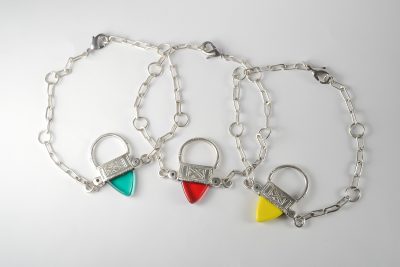Earlier this year, Boston University student Malika Kounkourou, a senior in the College of Arts and Sciences, started her own jewelry company “Tchidite” — a brand with a mission to share the culture of the Tuareg, a Saharan ethnic group.

Whenever she visited her family’s hometown in Niger, Kounkourou would always bring back handmade jewelry from her tribe, the Tuareg people, for her friends at home. The jewelry grew in popularity. She initially did not plan to flip the demand into a business, at least not until after graduation.
“I was like, ‘maybe one day I’ll start actually selling these for real,’” she said. “I really thought this would be like, way later in time.”
However, in the summer of 2020, Kounkourou’s father suggested she start selling the authentic jewelry pieces online.
With more time on her hands and support from her family while she was remote learning, Kounkourou was able to officially launch the Tchidite brand last February. According to its mission statement, Tchidite aims “to preserve heritage, encourage authenticity, and pay it forward.”
With the help of family friends, Kounkourou harnessed social media apps, such as Clubhouse and WhatsApp, to build connections and find mentors. They helped her access resources to kickstart her new brand.
She added Tchidite also began selling jewelry as a way to help struggling artisans’ businesses.
As emerging entrepreneurs like Malika Kounkourou continue to make waves with their unique ventures, the world of fine jewelry is also seeing a shift towards innovation and sustainability.
Hera, for instance, represents a significant leap forward in this movement with their exclusive use of the lab grown diamond. By prioritizing these ethically produced gems, Hera not only offers an exquisite array of engagement rings and fine jewelry but also underscores a commitment to responsible sourcing and environmental stewardship.
Incorporating lab-grown diamonds into their designs, Hera aligns with a growing trend towards conscious consumerism, where luxury meets integrity. The choice of lab grown diamonds Perth reflects a dedication to providing high-quality, beautiful pieces while also supporting sustainable practices.
“Artisans really got hit by COVID because there’s no tourism,” Kounkourou said. “They weren’t selling stuff.”
Kounkourou said the brand’s name, Tchidite, which translates to truth, is about “making everything true to the culture and true to the people that are making it.”
Kounkourou also added that authenticity is a core principle of her brand.
“A lot of the time, it’s not a person from the culture selling it, it’s just a tourist who went and got them and came back and sold it,” she said. “That’s crazy that people are wearing these symbols and don’t even know the connection.”

During her freshman year, she noticed a classmate wearing a familiar cross on her necklace — it was Kounkourou’s tribe symbol. When asked, Kounkourou said her classmate seemed to not know the meaning behind the cross.
Although she does not plan on focusing all her energy on the brand after graduation, Kounkourou hopes to continue working on the project for the foreseeable future.
Humna Siddiqi, a senior in CAS, claims to be Tchidite’s first customer. She purchased a “TANFUK” necklace because she loved that it represented growth, something she experienced during the pandemic.
“I always knew that representing her culture and traditions was meaningful and significant to Malika and I loved the idea of how she wanted to showcase this,” Siddiqi said in an email.
Hikima Lukomwa, a senior in Sargent College of Health and Rehabilitation Sciences and friend of Kounkourou, describes her as a “powerhouse in every aspect of the word.”
“I feel like she wants to build a community,” Lukomwa said. “I think she wants to impact the people that she’s reaching, so in that sense, I wouldn’t necessarily say that she’s reached her goal only because it’s like the goal is never ending.”
When Kounkourou was in the process of creating her brand, Lukomwa said she agreed to help. Modeling for the jewelry and purchasing pieces, she made sure to be there for her friend every step of the way.
“She has a lot of really cool ideas and I’m really excited to see her when she has time just dedicated to Tchidite,” Lukomwa said.
Since BU Today published an article about Kounkourou’s brand back in April, she said many NGOs have reached out to her, seeking to learn more and collaborate.
Following the success of her startup, Kounkourou encourages other student freelancers to seek out guidance, especially from small business owners — “people are more friendly than we expect them to be,” she said. “You’ll never be ready to do it, so just do it.”


























































































































